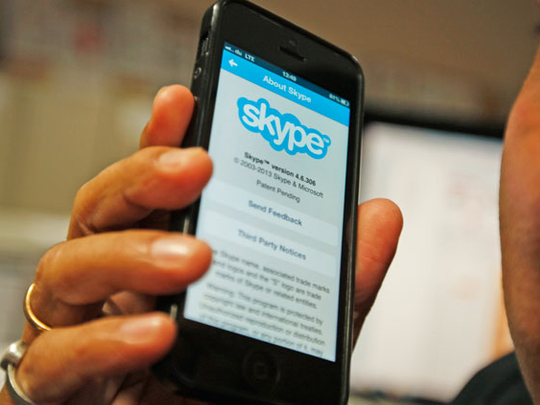
Dubai: Accessing a Virtual Private Network (VPN) by an individual in the UAE is legal; depending on some terms and conditions.
We answer your questions in relation to the recent Skype ban and VPN alternatives to make calls.
Read our guide about this and more here: Yep, Skype's blocked, what now?
What is a VPN?
A VPN network is like a secret tunnel that can be accessed by logging on through a US or UK server instead of the UAE server to open restricted sites, and at the same time protect user privacy. All the incoming and outgoing data that pass through this tunnel can't be spied into or stolen.
How does it work?
The premium apps on smartphones, tablets and computers now look at the IP (Internet Protocol) address to identify a computer or device on a network in order to know the location of the user.
However, consumers have found a way to unblock the apps using proxy or VPNs which hide users’ identity and geo-location by replacing your real IP address with the new one, so it looks like the content is coming from another IP address located somewhere else. This is illegal according to UAE cyber laws.
What is VPN primarily used for?
VPN started gaining traction when broadband came into the picture and people started streaming content. There are many VPN services available for free downloads as well as for a monthly fee.

VPN usage in the UAE
In the UAE, VPN services are used by some private individuals to access VoIP services, access some of the blocked websites and to watch geographically-restricted services like Hulu and/or Spotify.
Users with an American or a European subscription could watch any of the streaming services in the UAE with a VPN.
VPN for voice and video calls?
Now that Skype is banned, using VPNs to call home has become a necessity and there are some legal ways to do it.
Hi,
— Etisalat UAE (@etisalat) December 30, 2017
The access to the Skype App is blocked since it is providing unlicensed Voice over Internet Protocol (VoIP) Service, which falls under the classification of prohibited contents as per the United Arab Emirates' Regulatory Framework. Thanks
Du and Etisalat have VPN packages that allow users to use mobile data and/or service-provider Wi-Fi to connect and make video/voice calls internationally as long as the required apps are available on both ends.
These packages start at Dh50 per month and could be a legal answer to your call woes.
What does the law say?
Private individuals should only use legal VPN services or stand at a risk of facing millions of dirhams in fines.
The UAE Cybercrime Law No 5 of 2012, issued by President His Highness Shaikh Khalifa Bin Zayed Al Nahyan in 2012, includes stern punishments that could go up to a life sentence and/or a fine varying between Dh50,000 and Dh3 million depending on the severity and seriousness of the cybercrime.
While the UAE’s Telecommunications Regulatory Authority (TRA) has always maintained that the illegal use of VPN is against its policies, the police have also cautioned that legal action can be taken under Law Number 9 against users of VPN for any illegal activities.
Pros of VPN usage
1. Employees working remotely: Through a VPN, company staff working from home can log on to the organisational network and connect to internal company resources
2. Data protection: Users of free public Wi-Fi hotspots such as metro stations, airports or cafes can expose themselves to hackers. VPNs could help protect data in such cases.
3. E-banking services: To prevent hackers from accessing bank accounts, some banks block IP ranges of countries where financial fraud cases have been widely reported.
Cons of VPN usage
VPNs can potentially hide the malicious or criminal activities of certain groups or individuals who are out to harm the safety of a country or society.
With inputs from Naushad K. Cherrayil, Staff Reporter






_resources1_16a30b3fb8b_small.jpg)





